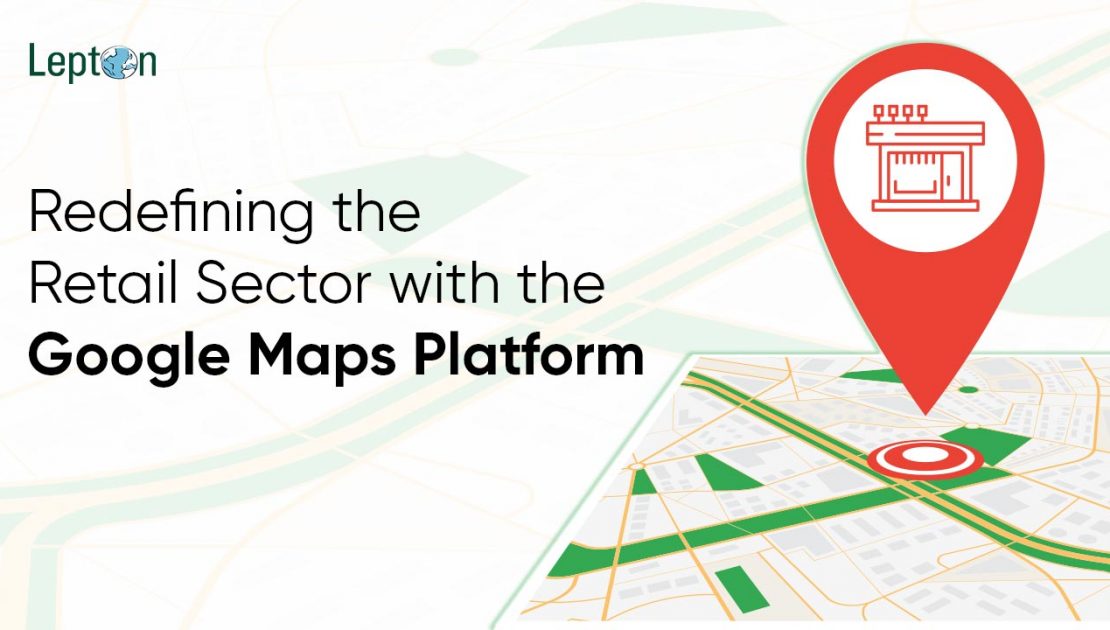It’s a tough world out there. Every day a new store pops up to try their luck in the competitive market. This is more true in a post-COVID society where customers’ buying habits have altered. With preferences becoming more and more attuned to user’s needs, companies have grown accustomed to the technology’s role in making their consumer base expand and more importantly, retain. This is where the Google Maps Platform comes to the fore. From generating smart location-based insights to giving a deep dive into the profile of potential target groups, the Google Maps Platform is a boon that makes a retail enterprise all the better.
In this blog, we will be covering the essential use cases the marquee platforms help in and how exactly they work wonders for businesses with scalability plans.
Google Maps Platform for Customer Experience
Each tech stack brings its virtues that make the business smarter and more effective in its communication strategy with its target audience. However, the effectiveness goes a yard ahead when it comes to the marquee Google Maps Platform.
- Real-time tracking and pickup: The Google Maps Platform application interface provides comprehensive accessibility to features that help keep track of goods in transit. APIs like the Geocoding API and Distance Matrix API make it easy for customers to identify a nearby location and display the distance on maps. For tracking, Direction API enables turn-by-turn navigation with a live feed of the traffic on the route. This is further complemented by a showcase of ETA. The last attribute proves further beneficial by presenting accurate delivery timelines for the customer.
The curbside pickup also becomes more accessible with nearby store locators and their details, all powered by an interactive map.
- Visualization of Business Information: Many metrics direct a business’s direction. With all the information available, a dashboard that comprehensively highlights the key pointers makes it more simplified for stakeholders to focus on what’s working and what’s not. Google Maps Platform displays all the critical data with key customer insights. From the keywords searched to the area with the most footfall – Google opens a plethora of opportunities backed by information.
- Omnichannel Model Support: Nowadays, companies want to maximize trade opportunities. And that means going online and offline at the same time. While Google stands unmatched with its capabilities with its search engine matrix, it is the ground info that makes it stand out for businesses. Powered by geospatial intelligence, the tech improves inventory management and checkout services to bolster online and offline traffic.
The Google Maps Platform Advantage for Retail
Like any other business, a retail store’s performance is dependent on how well its internal functions are at play. From marketing to supply chain management, the Google Maps Platform infuses a fresh new perspective to help retail businesses maximize their expansion prospect.
- Efficient Supply Chain and Logistics Management: As a backbone and foundation of every retail chain, the Google Maps Platform puts the spotlight on end-to-end value chain functioning. From optimizing the best routes from store delivery to consumer pickup, the transit time saved, guarantees a faster turnaround time, translating into more revenue. From a sustainability perspective, it also commits to searching for shorter routes that nullify GHG emissions. With demand forecasting at play, the organization also gets a heads-up on what the exact footfall will be, giving ample time to make supply chain operations more reliable, efficient, and robust.
- Focused Marketing Campaign: With the demographic information at hand, businesses can curate targeted marketing campaigns keeping in mind the mean income, age, footfall, and more. From coverage of technical aspects like Google Ads and keywords, the marketing effort sees much more finetuned results for attracting current and new user base.
- Competitor Analysis: From understanding the market dynamics to identifying possible opportunities by studying a competitor’s marketing strategy and product offerings, the Google Maps Platform helps enterprises do the groundwork. The focus on each pillar makes the leadership all the more confident with the GTM plans.
Real-world use case of Google Maps Platform
The retail industry has seen incredible growth with the implementation of the Google Maps Platform. With the increase in footfall to generate revenue, the use cases have showcased the upward trajectory of businesses.
- A known hypermarket chain sought to minimize customer wait times while improving pick-up efficiency. Google Maps Platform with its ETA feature helped the store chain prepare customer orders before their arrival. The company reported an overall 25% reduction in pickup time, increasing customer satisfaction and operational efficiency.
- Similarly, a furniture-based retail store wanted to enhance its in-store navigation experience. With Google Maps Platform indoor mapping which categorized easy navigation based on products – the company observed a 15% increase in time spent by customers. Thus, resulting in better cart value.
- A sport-centered retail conglomerate wanted to help out its customers with faster navigation to its nearest store. By integrating the titular application platform with its app and website, the retail store saw a 20% increase in online-to-offline footfall.
Future of Retail with Google Maps Platform
The inculcation of artificial intelligence and machine learning has made it possible for enterprises to go beyond the usual definition of expansion. By studying the company’s operative data, the Google Maps Platform helps analyze the best way ahead. This is done by understanding the demography, the potential customers, mean income, logistics possibilities, and much more. Owing to information vetted by machine learning algorithms, leadership now has access to constructive insights that can shape their retail operations. From choosing a location that has sales potential to the navigation routes that keep the daily operations smoothly running – the Google Maps Platform unlocks the retail sector’s potential. Also, with the inculcation of GenAI, stakeholders will be able to tune their offerings to be more in line with their customers’ needs. This will focus on minimum human intervention and better presence across omnichannel platforms.
Lepton Software for Google Maps Platform
When planning your retail sector expansion it is important to partner with an end-to-end GIS solution provider that simplifies the road to your objectives. Lepton Software does exactly that. With a portfolio spanning 30+ years, and an unmatched group of experts coupled with multinational projects, Lepton paves the most effective path. Seamlessly inculcating Google Maps Platform API with your existing retail mechanism, your business will see an upward trend in the form of revenue, more online-to-offline footfall, and better brand value, all resulting in a competitive standing in the market. Helping you understand the nuances of location intelligence for business ascendancy, your think tank gets access to productive information like demography’s affluence, age band, density, and most importantly, a heads-up about the competition. The experts at Lepton will understand your end goal and come up with a roadmap that benefits your business.
So, if you have a vision for your retail chain and need someone to make your presence count, contact us for a quick walkthrough of our abilities. We’re sure that we’ll be the catalyst for taking your brand to the next level.

